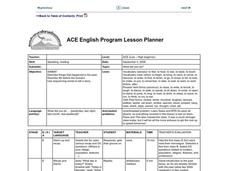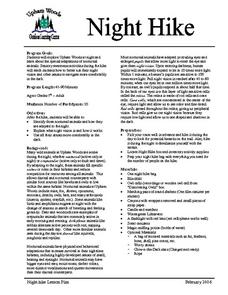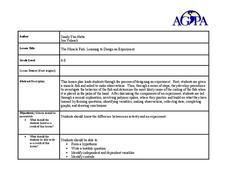Curated OER
Reading Examples
Young writers read excerpts from Gary Paulsen's memoir to identify figurative and literal language that contain sensory details. They determine which selections are examples of sensory language and fi the language is used literally or...
Curated OER
Features of An Effective Advertisement
In this advertisement instructional activity, students read the features of an effective advertisement before noting whether these feature are include in an ad the are looking at. They look at an advertisement and tell whether it is...
Curated OER
The Right Stuff
In this self-esteem worksheet, young scholars learn that the best attributes in people are not physical, but personality related. Students identify and write about a personal role model, then list non-physical attributes in themselves...
Curated OER
Abe Lincoln's Log Cabin
Students study Abe Lincoln and make a log cabin out of pretzel sticks and chocolate frosting.
Curated OER
Identifying Figurative Language From Edgar Allan Poe
In this figurative language worksheet, students identify the figurative language technique being used in each of the 10 sentences. The sentences are based on Edgar Allan Poe's literary work.
Curated OER
Writing a Memorable Poem
Nascent poets carefully examine a color photograph and then respond to a series of questions. Using these responses, they craft a poem prompted by the image. A link to powerful photos is included so the exercise can be repeated.
Curated OER
Human Parts
Very young learners who are studying the human body will use this worksheet to identify certain body parts. A cartoon drawing of a boy is shown, and learners must draw lines matching up words such as arm, tummy, foot, and toes to the...
Indiana University
World Literature: "One Evening in the Rainy Season" Shi Zhecun
Did you know that modern Chinese literature “grew from the psychoanalytical theory of Sigmund Freud”? Designed for a world literature class, seniors are introduced to “One Evening in the Rainy Season,” Shi Zhecun’s stream of...
Curated OER
All About Me from A-Z
Use the letters of the alphabet as prompts for autobiographical poems.
Curated OER
Thanksgiving Lesson Plan
A great ESL lesson plan focuses on Thanksgiving, the Pilgrims, and the Mayflower. Printable versions of the Mayflower, a Thanksgiving booklet, a Pilgrim house pattern, and links to other free sites that offer all sorts of Thanksgiving...
Curated OER
Sound Blending Lesson Plan
Mr. Snowman wants to help emerging readers understand compound words, so he segments some familiar words to help them see that they are made of two distinct words. Learners repeat the words, both segmented and blended, and observe them...
University of North Carolina
Verb Tenses
Twelve categories of verbs exist in the future tense, ranging from simple present to future perfect progressive, but only three have a place in academic writing. Those three tenses make up the content of an informational handout that...
Prestwick House
Poe’s “The Raven” – Unity of Effect
How do Poe's choices of imagery, rhythm and rhyme scheme, and structure help build the desired single effect of "The Raven"? After listening to a dramatic reading of the poem, class members consider whether Poe's choices do...
BBC
The Sound Monster - Words That Make Sounds
There are words in the English language that actually make sounds, such as vroom, and, buzz. Here is a clever lesson which introduces young readers to these sound-making words. They play an interactive game on the computer that has...
Curated OER
What Did You Do?
English learners practice using the past tense by participating in a time description activity. They identify the differences between verbs when they are used to describe current events or past events. Students answer questions using...
Curated OER
Improving Descriptive Writing: Painting an Original Picture
Descriptive writing is rich in sensory appeals and paints pictures in the minds of readers. Show young writers how to use an on-line thesaurus and a cliché website to create fresh, descriptive writing. The presentation ends with an...
Curated OER
Resources
Students are introduced to different context clues. For this context clues lesson, students analyze sentences to find the meaning of a word using context clues.
Curated OER
Night Hike
Students explore Upham Woods at night and investigate about the special adaptations of nocturnal animals. They identify three nocturnal animals and how they are adapted to the night. Students explain what night vision is and how it works.
Curated OER
The Nervous System and the Effects of Drugs
For this nervous system worksheet, students read information about how the body receives and sends out information through the peripheral nervous system and central nervous system. Then students complete 3 short answer questions.
Curated OER
Observations and Inferences
Young scholars observe how to distinguish observations form inferences. In this examining inferences lesson students list observations relating to the activity and discuss the importance of them.
Curated OER
Sounds of the Wetlands
Learners identify the sounds of different bird calls. In this biology lesson, students create a sound map. They explain how this method is important in tracking wildlife.
Curated OER
The Miracle Fish: Learning to Design an Experiment
Middle schoolers develop procedures to explore the behavior of fish. In this scientific experiment lesson students from a hypothesis, write a question, identify different variables and controls in their experiment.
Curated OER
Writing Bug- Let it Snow- Writing Prompt Worksheet
In this writing worksheet, students write an essay that describes what it is like to be in an area of the world where it snows in the winter. They write the essay from the point of view of educating someone who has never seen snow before.
Curated OER
The Houdini Box: Compare and Contrast
How did Houdini do it? After reading a short passage about magicians and their tricks, readers are asked to compare and contrast some of the illusions these prestidigitators create.

























